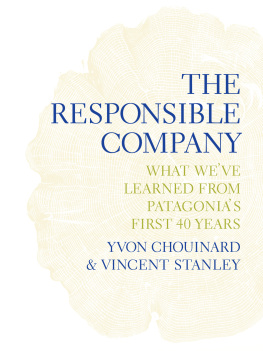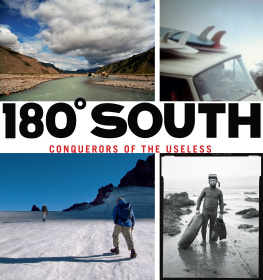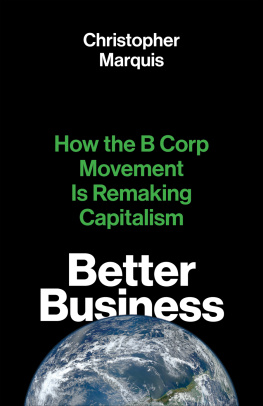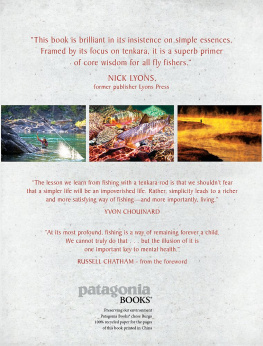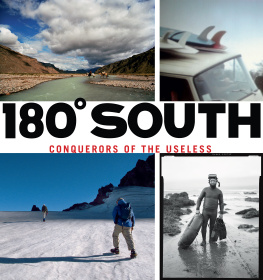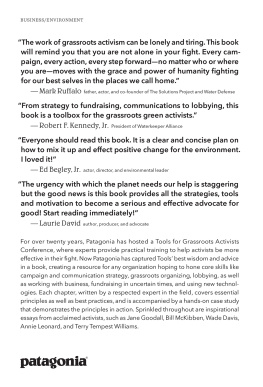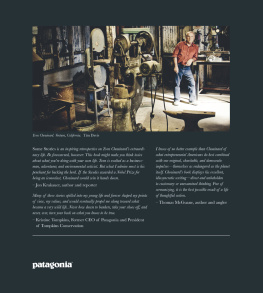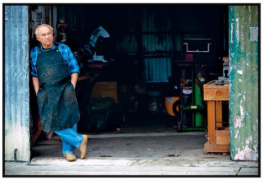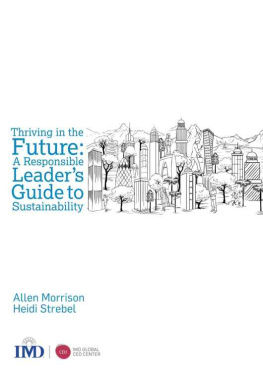ALSO BY YVON CHOUINARD
Let My People Go Surfing (2006)
Climbing Ice (1982)
The most important right we have is the right to be responsible.
Gerald Amos
THE
RESPONSIBLE
COMPANY
YVON
CHOUINARD
AND
VINCENT
STANLEY

THIS BOOK IS DEDICATED TO ALL PATAGONIA EMPLOYEES, PRESENT AND PAST
CHAPTER 1
What We Do For a Living
W E ARE ALL STILL in the earliest stages of learning how what we do for a living both threatens nature and fails to meet our deepest human needs. The impoverishment of our world and the devaluing of the priceless undermine our physical and economic well-being.
Yet the depth and breadth of technological innovation of the past few decades shows that we have not lost our most useful gifts: humans are ingenious, adaptive, clever. We also have moral capacity, compassion for life, and an appetite for justice. We now need to more fully engage these gifts to make economic life more socially just and environmentally responsible, and less destructive to nature and the commons that sustain us.
This book aims to sketch, in light of our environmental crisis and economic sea change, the elements of business responsibility for our time, when everyone in businessat every levelhas to deal with the unintended consequences of a 200-year-old industrial model that can no longer be sustained ecologically, socially, or financially.
The co-authors have been involved with Patagonia since its inception nearly forty years ago. But it is not the purpose of this book to retell our companys history in detail. That story may be found in Yvons book, Let My People Go Surfing.
This book, though it draws on our experience at Patagonia, aims to be useful to all people who see the need for deep change in business practices and who work in companies quite unlike ours. Although we mostly address companies that make things, or like us, design things made by others, this book is germane to all businesses that offer a service or to nongovernmental organizations (NGOs) and nonprofits that want to treat their people well and reduce the environmental impact of their operations. This book is for anyone who works, not just business leaders and managers. It is also for business students and other young people who want to engage their best, deepest self in the working life that stretches ahead.
You should know that at its beginning Patagonia was meant to be not a risk-taking, environment-obsessed, navel-gazing company but an easy-to-milk cash cow. Yvon created Patagonia as an offshoot of the Chouinard Equipment Company, which made excellent mountain-climbing gear recognized as the best in the world, but very little money. Patagonia was intended to be a clean and easy companydesk jockeys workin contrast to the ten hours a day sweat and toil of hammering out pitons with a coal-fired forge or drilling and cutting chocks from extruded aluminum. The clothing business required no expensive dies to amortize and had a much broader customer base than a few dirtbag climbers. Who knew then that cotton could be as dirty as coal?
At Chouinard Equipment we were used to a life-or-death standard of product quality: you did not sell an ice axe without checking it closely for a hairline fracture or any other fault. Although we applied the same standard to rugby shirts (they had to be thick and tough to survive the skin-shredding sport of rock climbing), we knew that seam failure was unlikely to kill anyone. Patagonia was to be our irresponsible company, bringing in easy money, a softer life, and enough profits to keep Chouinard Equipment in the black.
Our responsibilities as businesspeople came slowly and almost involuntarily to light while we focused on the real work of designing our clothes and getting them made and sold. In the chapters ahead, well describe a handful of moments that stunned us into consciousness (including the discovery that cotton, our most commonly used natural fiber, turned out to be the most toxic) to illustrate how one step makes the next step possiblea simple lesson but key.
We cant pose patagonia as the model of a responsible company. We dont do everything a responsible company can do, nor does anyone else we know. But we can illustrate how any group of people going about their business can come to realize their environmental and social responsibilities, then begin to act on them; how their realization is progressive: actions build on one another.
We used to think that because Patagonia grew out of a small band of climbers and surfers who have a special love for the natural world and a palpable need to be in it, feel a part of it, that we were somehow exceptional as a business. Twenty years ago, we didnt think we had much to say to the woman next to us on the plane who might wear a Chanel suit and pearls and fetch a copy of Fortune out of her Tods handbag (we would have been accidentally upgraded to business class to be anywhere near her). Now, though, we can think of a number of topics we might have discussed, from design to inventory control to the implications of material shortages for long-term planning. We now know, from talking to all kinds of businesspeople, that Patagonia, if exceptional at all, is so only at the margins. As mice and men share 99 percent of their genes, so do Wal-Mart, BP, and Patagonia. Patagonia may seem different because its owners are committed to social and environmental change; and our company is privately held, not publicly traded, so we can take on greater risks. But our management requires the same sets of skills, pursues the same opportunities, and faces the same competition and constraints as any other business.
We started as climbers and surfers, so our direct engagement with nature may have allowed us to recognize the environmental crisis earlier than others and begin to act on it more quickly. But eventually the crisis would become apparent to everyone in business. Soon we would trade stories with other businesses that acted out of environmental and social concerns. In our earliest days, we talked with the founders of Ben & Jerrys, The Body Shop, and Smith & Hawken. Later, conversations with REI, The North Face, and other companies in the outdoor industry led to the creation of the Conservation Alliance, a nonprofit that protects wilderness as habitat and space for recreation.
When we finally turned a cold eye to our own wasteful and polluting industrial practices, or those done in our name by our suppliers, we sought out and found other concerned companies willing to offer advice and help. Often they were huge, and included Levi Strauss, Nike, Timberland, and The Gap. We spoke with others farther afield, like the courtly carpet-tile manufacturer Ray Anderson, founder of Interface, whose spiritual epiphany upon reading Paul Hawkens The Ecology of Commerce led him to become, as The Economist noted in his obituary, Americas greenest businessman. It turned out we were not unique in our desire to become a more responsible business.
When we wanted to improve our quality without increasing our costs, we shared notes with Jack Stack, who with other employees had bought back the failing Springfield Remanufacturing Company from International Harvester and had made it successful through innovations in participatory corporate control (i.e., listening to front-line employees) and open-book management. Jack taught us that any successful business strategy had to engage the intelligence of the people on the floor as much as of those at the top.

